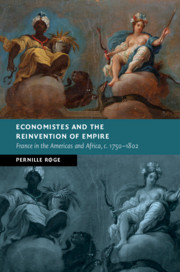Book contents
- Economistes and the Reinvention of Empire
- New Studies in European History
- Economistes and the Reinvention of Empire
- Copyright page
- Dedication
- Contents
- Maps and Figures
- Acknowledgements
- Note on the Text
- Abbreviations
- Introduction
- Chapter 1 A Colonial Empire in Crisis
- Chapter 2 Empire beyond the Mercantile System
- Chapter 3 Between Enslaved Territories and Overseas Provinces
- Chapter 4 Supplying or Supplanting the Americas
- Chapter 5 A Revolutionary Crescendo
- Conclusion Ancien Régime Legacies
- Bibliography
- Index
Chapter 2 - Empire beyond the Mercantile System
Published online by Cambridge University Press: 29 July 2019
- Economistes and the Reinvention of Empire
- New Studies in European History
- Economistes and the Reinvention of Empire
- Copyright page
- Dedication
- Contents
- Maps and Figures
- Acknowledgements
- Note on the Text
- Abbreviations
- Introduction
- Chapter 1 A Colonial Empire in Crisis
- Chapter 2 Empire beyond the Mercantile System
- Chapter 3 Between Enslaved Territories and Overseas Provinces
- Chapter 4 Supplying or Supplanting the Americas
- Chapter 5 A Revolutionary Crescendo
- Conclusion Ancien Régime Legacies
- Bibliography
- Index
Summary
The crisis of the Ancien Régime colonial empire sponsored a flurry of political economic debates on how to preserve French colonial and metropolitan prosperity. Attentive to the numerous economic recipes in circulation, Chapter 2 shows how the French Physiocrats broke with prevailing norms and offered a radical new vision of empire. Based on their connections to the colonies, the French government, and European intellectual elites, the co-founders of Physiocracy - Victor Riqueti de Mirabeau and François Quesnay – crafted a powerful critique of the French plantation complex and its underlying exclusive commercial system which they baptised the ‘mercantile system’. Casting the ideal French colonial empire as an agricultural empire with overseas provinces, they and their followers promoted colonial production based on free labour, international free trade, and the exportation of ‘civilisation’ to Africa. The chapter explores how Mirabeau, Quesnay, and acolytes such as Pierre-Paul Le Mercier de la Rivière, Pierre Samuel Du Pont de Nemours, Nicolas Baudeau, and Pierre-Joseph-André Roubaud developed the Physiocratic colonial doctrine. It also carefully pinpoints internal tensions among the main intellectual participants with regard to colonial slavery and historical specificity.
Keywords
- Type
- Chapter
- Information
- Economistes and the Reinvention of EmpireFrance in the Americas and Africa, c.1750–1802, pp. 64 - 104Publisher: Cambridge University PressPrint publication year: 2019

